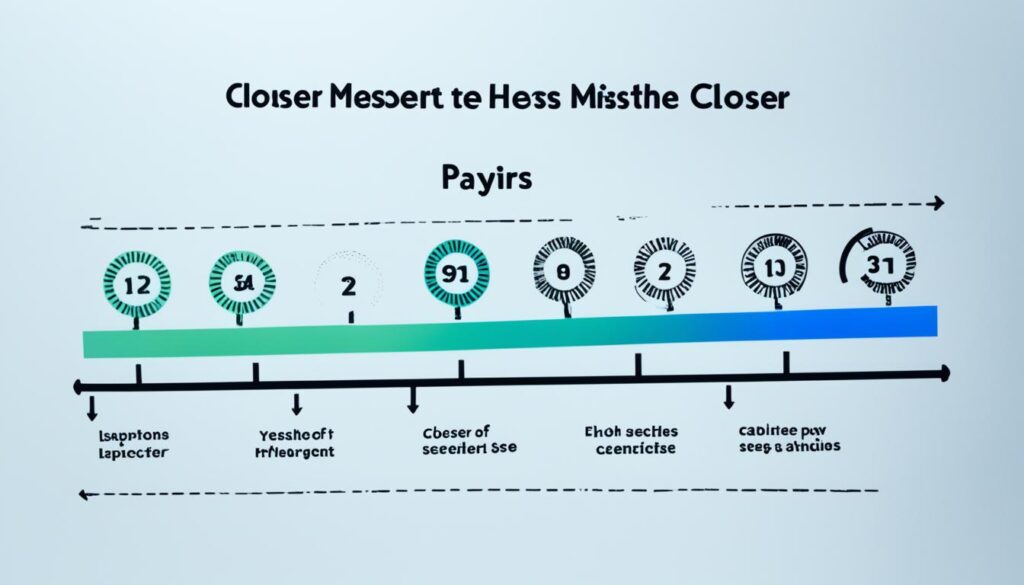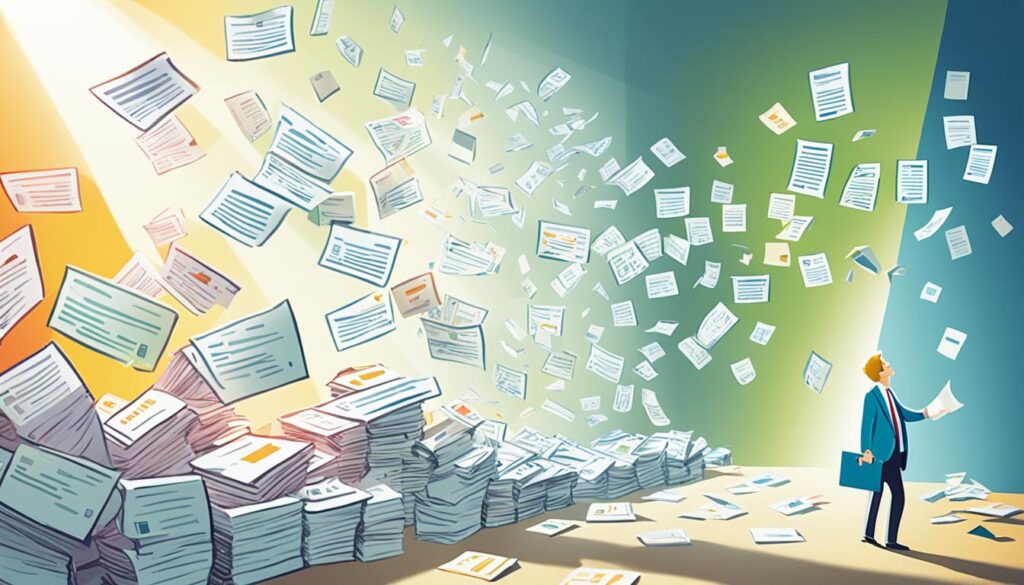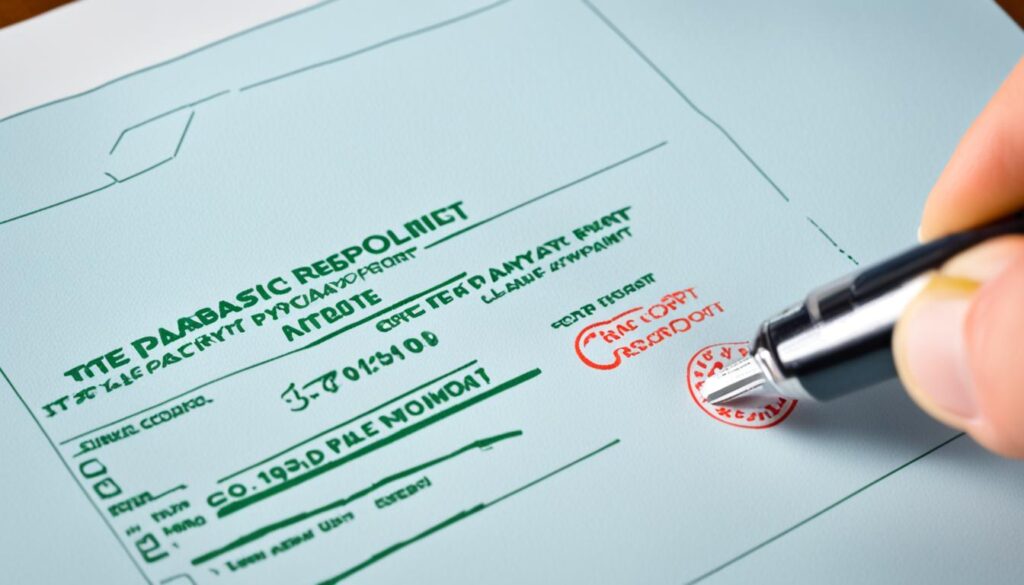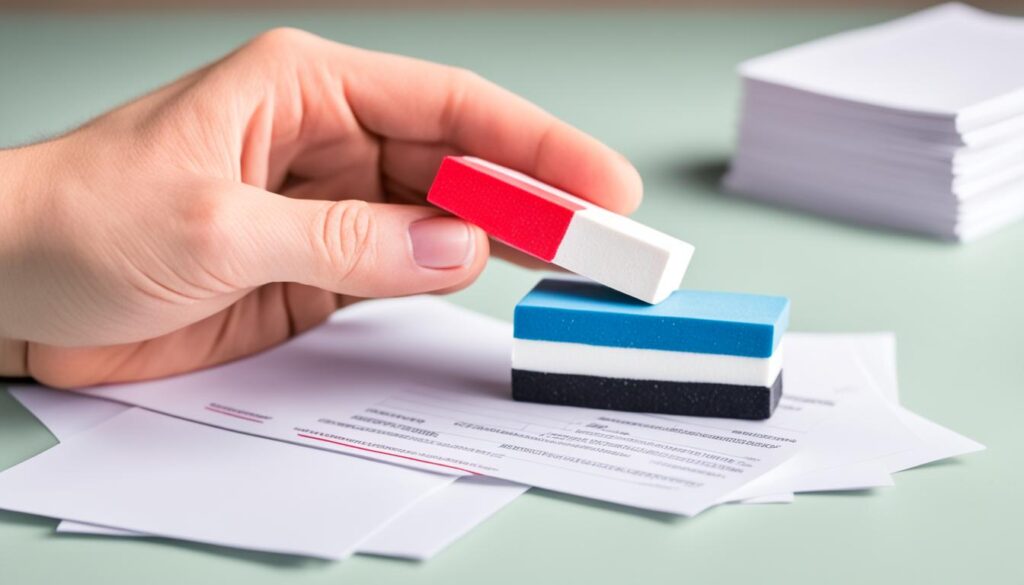Were you aware that late payments could have a significant impact on your credit score? Whether it’s a missed payment on a credit card, loan, or utility bill, just one late payment can have long-term consequences. In this article, I will share my own experience with credit repair and provide advice on how to remove late payments from your credit report. Discover how you can take control of your credit and improve your financial health.
Key Takeaways:
- Late payments can negatively affect your credit score.
- Review your credit reports for inaccurate information.
- Dispute inaccurate late payments with credit bureaus and creditors.
- Understand the seven-year rule for late payments on credit reports.
- Consider the goodwill letter approach or pay-for-delete arrangements.
Understanding Late Payments and Their Impact
Late payments on your credit report can have a significant impact on your credit score and overall financial health. Understanding the consequences of late payments and the available strategies for their removal is essential for anyone looking to improve their credit. In this section, I will discuss the detrimental effects of late payments and provide valuable insights into effective late payment removal strategies and credit restoration methods. Whether you choose to pursue professional credit repair services or engage in DIY credit repair, this information will empower you to take control of your credit journey.
When it comes to late payments, it’s important to note that accuracy is key. Accurate late payments cannot be removed from your credit report. However, if you find any inaccuracies or discrepancies, there are steps you can take to dispute and potentially remove them.
Impact of Late Payments
Late payments can significantly lower your credit score, making it challenging to secure new credit or loans. Lenders view late payments as a sign of financial irresponsibility, which may lead to higher interest rates or even loan denials. Additionally, late payments can stay on your credit report for up to seven years, further impacting your creditworthiness.
Late Payment Removal Strategies
Fortunately, there are strategies available to help remove late payments from your credit report. These strategies include:
- Reviewing your credit reports: Obtain copies of your credit reports from the three major credit bureaus (Equifax, Experian, and TransUnion) to identify any inaccurately reported late payments.
- Filing a dispute: If you find any inaccuracies, file a dispute with the credit bureau that issued the report. The bureau will investigate the dispute and remove the late payment if it is found to be incorrect.
- Utilizing goodwill letters: If you made a genuine mistake and have a good payment history, you may consider writing a goodwill letter to the creditor, explaining the situation and requesting the removal of the late payment as an act of goodwill.
- Seeking professional assistance: If the DIY approach seems overwhelming, you may opt to work with a reputable credit repair company that specializes in late payment removal and credit restoration. These professionals have the knowledge and experience to navigate the complexities of credit repair.
DIY Credit Repair
While professional credit repair services can be beneficial, many individuals opt for the do-it-yourself (DIY) approach to credit repair. DIY credit repair allows you to take control of your credit journey, save money on fees, and gain a deeper understanding of how credit works.
“DIY credit repair can be an effective and empowering way to improve your credit score and remove inaccurate late payments. By following the right strategies and staying persistent, you can achieve significant results on your own.”
Remember, credit repair is a step-by-step process that requires patience, diligence, and adherence to legal guidelines. Whether you choose DIY credit repair or professional assistance, it’s crucial to stay informed, monitor your progress, and maintain good credit habits moving forward.
Review Your Credit Reports for Inaccuracies
To begin the process of fixing your credit after late payments, it is crucial to review your credit reports from the three major credit bureaus – Equifax, Experian, and TransUnion. These reports provide a comprehensive overview of your credit history and can help identify any inaccurately reported late payments.
When reviewing your credit reports, pay close attention to the accounts associated with the late payments. Note down the details of each account, including the creditor’s name, the amount owed, and the late payment dates. This information will be essential when disputing inaccurate late payments on your credit report.
It is recommended to obtain copies of your credit reports from all three bureaus to ensure a thorough review. You can request a free copy of your credit report from each bureau once a year through AnnualCreditReport.com, the only authorized website for free credit reports.
If you notice any inaccurately reported late payments on your credit reports, it is important to take steps to have them corrected. In the next section, we will discuss how to remove late payments from your credit and fix your credit score.

Sample Credit Report Review:
| Creditor | Amount Owed | Late Payment Dates |
|---|---|---|
| Credit Card Company A | $500 | January 2022, March 2022 |
| Loan Provider B | $2,000 | February 2022 |
| Utility Company C | $100 | April 2022 |
Above is a sample table illustrating how you can organize the information from your credit report review. This table helps identify the accounts with late payments and provides a clear overview of the associated details. Use this format to record the information specific to your credit report review.
Dispute Inaccurate Late Payments
If you discover inaccurate late payments on your credit reports, don’t panic. You have the right to dispute them and have them removed. The key is to take prompt action to rectify any errors and restore your creditworthiness. Here are the steps you can follow to dispute inaccurate late payments:
- Review your credit reports: Go through your credit reports from the major credit bureaus – Equifax, Experian, and TransUnion. Identify any late payments that are inaccurately reported.
- File a dispute with the credit bureau: Contact the credit bureau that issued the report containing the error. File a formal dispute, providing evidence or documentation to support your claim. Be clear and concise in stating why the late payment is inaccurate.
- Investigation by the credit bureau: The credit bureau will investigate your dispute by contacting the creditor who reported the late payment. They will review the provided evidence and determine if the late payment is incorrect.
- Removal of the late payment: If the credit bureau finds that the late payment is inaccurate, they will remove it from your credit report. Your credit report will be updated accordingly, reflecting the removal of the late payment.
- Dispute with the creditor: If the credit bureau fails to remove the late payment or deems it accurate, you can dispute the mistake directly with the creditor. Reach out to the creditor and explain why the late payment should be removed. Provide any supporting documents or information that strengthens your case.
“Disputing inaccurate late payments is an essential step in credit repair. By taking the necessary actions, you can restore the accuracy of your credit reports and improve your creditworthiness.”
Remember, disputing inaccurate late payments requires persistence and patience. Keep track of your communications, maintain copies of all correspondence, and follow up regularly with both the credit bureau and the creditor until the matter is resolved.
Below is a table summarizing the steps to dispute inaccurate late payments on your credit report:
| Steps | Description |
|---|---|
| 1 | Review your credit reports |
| 2 | File a dispute with the credit bureau |
| 3 | Investigation by the credit bureau |
| 4 | Removal of the late payment |
| 5 | Dispute with the creditor |
Disputing inaccurate late payments is an essential step in credit repair. By taking the necessary actions, you can restore the accuracy of your credit reports and improve your creditworthiness.

Understand the Seven-Year Rule
Late payments can have a long-lasting impact on your credit report. It’s important to understand the seven-year rule when it comes to late payments. According to this rule, if a late payment is correctly reported, it will stay on your credit reports for up to seven years.
However, it’s crucial to note that after seven years, the late payment should naturally fall off your credit reports. If you find a late payment that is more than seven years old on your credit report, it may be a mistake and can be disputed.
Disputing Old Late Payments
If you notice a late payment on your credit report that is past the seven-year mark, it’s essential to take action. Start by gathering all the necessary documentation and evidence regarding the late payment. This may include payment receipts, letters, or any other relevant records.
Once you have the required documentation, contact the credit reporting agency that is displaying the outdated late payment. You can submit a dispute letter explaining the error and requesting the removal of the outdated information from your credit report.
Remember, you must be specific in pointing out the error and provide evidence to support your claim. This will increase your chances of successfully disputing the late payment and having it removed from your credit report.
Tracking the Removal Process
After submitting a dispute, it’s important to keep track of the removal process. The credit reporting agency has an obligation to investigate your dispute within 30 days of receiving it. They will contact the creditor or collection agency to verify the late payment information.
If the creditor or collection agency fails to respond within the given timeframe, the credit reporting agency must remove the late payment from your credit report.
Make sure to follow up with the credit reporting agency to ensure that the outdated late payment is removed promptly. You can request a copy of your updated credit report to verify that the late payment has been successfully deleted.
| Steps to Remove Late Payments Past the 7-Year Mark |
|---|
| 1. Gather documentation and evidence of the outdated late payment. |
| 2. Contact the credit reporting agency displaying the outdated late payment. |
| 3. Submit a dispute letter explaining the error and requesting removal. |
| 4. Be specific in pointing out the error and provide supporting evidence. |
| 5. Track the removal process by following up with the credit reporting agency. |
By understanding the seven-year rule and taking proactive steps to dispute outdated late payments, you can ensure that your credit report accurately reflects your financial history.

The Goodwill Letter Approach
If you have made a late payment and it is accurately reported on your credit reports, you can try sending a goodwill letter to the creditor. A goodwill letter explains the circumstances behind the late payment and asks for forgiveness. While there is no guarantee that the creditor will remove the late payment, it is worth a try.
Writing a persuasive goodwill letter requires careful thought and attention to detail. Here are some key steps to follow:
- Gather necessary information: Start by gathering all relevant information such as your account number, the payment date, and the reason for the late payment. This will help you provide accurate and detailed information in your letter.
- Express sincerity and remorse: Begin your letter by expressing sincere remorse for the late payment and take full responsibility for the mistake. Emphasize that this late payment is an exception and not reflective of your overall creditworthiness.
- Explain the circumstances: Provide a clear and concise explanation of the circumstances that led to the late payment. Be honest and transparent, but also highlight any extenuating circumstances that may have contributed to the late payment.
- Highlight your payment history: If you have a history of making payments on time, mention it in your letter. This can help demonstrate that the late payment was an isolated incident and not a pattern of behavior.
- Request forgiveness: Politely ask the creditor to consider removing the late payment from your credit report as a gesture of goodwill. Explain how the removal of the late payment would significantly improve your creditworthiness and financial situation.
- Provide supporting documentation: Include any supporting documentation that can substantiate your explanation or prove your payment history. This can include bank statements, receipts, or any other relevant records.
- End the letter on a positive note: Thank the creditor for their time and consideration. Express your commitment to maintaining a positive credit history and promise to make timely payments in the future.
Remember, there is no guarantee that the creditor will remove the late payment from your credit report. However, a well-crafted goodwill letter can show your sincerity and demonstrate your willingness to take responsibility for your actions. It is essential to be polite, professional, and concise in your letter to maximize your chances of success.
“A well-written goodwill letter can show your sincerity and increase the likelihood of the creditor removing the late payment from your credit report.”
While waiting for a response from the creditor, continue practicing good credit habits, such as making timely payments and keeping your credit utilization low. Monitoring your credit regularly will also help you stay informed about any changes or updates to your credit report.

Pay-for-delete Arrangements
When dealing with late payments on your credit report, you may come across debt collectors offering pay-for-delete arrangements. This enticing proposition promises to remove a late payment from your credit report if you pay off the debt. However, it is crucial to understand the implications of this method.
While the idea of having a late payment removed from your credit report may seem appealing, it is important to note that creditors are obligated to report accurate information. Pay-for-delete arrangements circumvent this obligation and may raise ethical concerns.
Instead of relying on pay-for-delete arrangements, I strongly recommend taking matters into your own hands by disputing incorrect information on your credit report. By disputing incorrect late payments, you can rectify inaccuracies and protect your creditworthiness without resorting to potentially questionable tactics.

Why Dispute Inaccurate Information Yourself?
Disputing inaccurate late payments yourself gives you control over the process and ensures that accurate information is reported on your credit report. It also saves you money that would otherwise be spent on pay-for-delete arrangements.
By following the dispute process, you can request credit bureaus to investigate the late payment and remove it if it is found to be inaccurate. This approach empowers you to actively manage your credit and take the necessary steps to improve your financial reputation.
My Experience with Disputing Late Payments
When I encountered a late payment on my credit report, I decided to dispute it myself rather than pursuing a pay-for-delete arrangement. I gathered evidence supporting my claim, ensuring a strong case for the credit bureau’s investigation.
After submitting the dispute, I patiently awaited the results. Within a few weeks, I received a notification stating that the late payment had been removed from my credit report. This successful outcome not only improved my credit profile but also strengthened my belief in the effectiveness of disputing inaccurate information.
The Importance of Being Proactive
Taking control of your credit repair journey by disputing late payments provides you with the opportunity to actively improve your financial standing. It also sends a clear message to creditors and credit bureaus that you are vigilant about the accuracy of your credit report.
Remember, disputing inaccurate late payments is a legitimate and effective method that can lead to the removal of negative information from your credit report. By being proactive, you can protect your creditworthiness and lay the foundation for a brighter financial future.
| Pros of Disputing Late Payments Yourself | Cons of Pay-for-delete Arrangements |
|---|---|
|
|
The Importance of Timely Payments
One of the most effective ways to improve your credit and avoid late payments on your credit reports is by ensuring that you pay your bills on time. Timely payments demonstrate to creditors and lenders that you are responsible and can be trusted to manage your financial obligations.
To help you stay on top of your payments, consider setting up automatic payments for your credit accounts. This convenient feature ensures that your bills are paid on time every month, eliminating the risk of forgetfulness or missed due dates. By automating your payments, you can have peace of mind knowing that you are consistently meeting your financial responsibilities.
Even if you do encounter a late payment on your credit reports, there is a silver lining. The impact of a late payment on your credit decreases over time. Credit scoring models typically assign more weight to recent late payments, while older late payments have less influence on your credit score.
The longer it has been since the late payment occurred, the less impact it will have on your credit.
For instance, a late payment that occurred several years ago will have less of a negative impact on your credit compared to a recent late payment. This gradual diminishing effect is good news for individuals who are actively working to remove late payments from their credit reports.
By practicing timely payments and staying vigilant about your financial obligations, you can gradually eliminate late payments from your credit reports and improve your credit standing.

| Benefits of Timely Payments | Consequences of Late Payments |
|---|---|
|
|
Can Credit Repair Companies Remove Late Payments?
When it comes to removing late payments from your credit report, credit repair companies may claim to offer a quick and easy solution. However, it is important to approach their services with caution and understand the limitations. While these companies may promise to remove late payments, they cannot eliminate accurate information from your credit report.
The truth is, disputing inaccurate late payments can be done on your own without the help of credit repair companies. By understanding the process and following the right steps, you can take control of your credit and work towards improving your credit score.
Here are some credit repair tips to consider:
- Review your credit reports: Start by obtaining copies of your credit reports from all three major credit bureaus – Equifax, Experian, and TransUnion. Take a close look at the late payments listed on your reports and identify any inaccuracies or errors.
- Dispute inaccurate late payments: If you find late payments that are incorrectly reported, you have the right to dispute them. File a dispute with the credit bureaus to have these late payments investigated and potentially removed from your credit report.
- Understand the process: Educate yourself about the dispute process and familiarize yourself with your rights as a consumer. This can help you navigate the credit repair journey more effectively and ensure you are taking the appropriate steps.
- Practice good credit habits: While removing inaccurate late payments is important, it is equally essential to develop good credit habits moving forward. Make timely payments, keep credit card balances low, and avoid taking on excessive debt.
Remember, credit repair companies cannot magically erase accurate late payments or guarantee specific results. Taking control of your credit and working towards improvement is something you can do on your own with the right knowledge and determination.

By following these credit repair tips and actively managing your credit, you can improve your credit score over time and regain financial stability. Remember, removing late payments from your credit report is a process that requires patience and consistent effort, but the end result is worth it.
How Long Do Late Payments Impact Your Credit?
Late payments can have a lasting impact on your credit scores. The effects of late payments can be felt for up to seven years, as they remain on your credit report. However, it’s important to note that the impact of late payments on your credit decreases over time.
If you have been actively working on improving your credit and practicing good credit habits, the negative impact of late payments will gradually diminish. By removing inaccurate late payments and implementing effective strategies, you can improve your credit score over time.
It’s crucial to be proactive in managing your credit and taking the necessary steps to remove any inaccuracies from your credit report. By closely monitoring your credit and addressing any late payments promptly, you can minimize their impact and work towards a healthier credit profile.
Remember, improving your credit score is a gradual process that requires patience and persistence. By consistently practicing good credit habits and removing any inaccuracies, you can steadily improve your credit over time.

“Improving your credit score is a gradual process that requires patience and persistence.”
Late Payments and Other Negative Consequences
Late payments can have far-reaching consequences beyond just a negative impact on your credit. It’s important to understand the potential ramifications of late payments and take steps to avoid them. Here are some of the negative consequences you may face:
- Late fees: When you miss a payment deadline, creditors often charge late fees. These fees can add up quickly and increase the amount you owe.
- Interest rate increases: Late payments can trigger an increase in interest rates, making it more expensive to borrow money in the future.
- Negative credit impact: Late payments are recorded on your credit report and can significantly lower your credit score. This can make it difficult to obtain new credit or secure favorable terms.
- Difficulty obtaining loans: Lenders are less likely to approve loan applications from individuals with a history of late payments. This can make it challenging when you need financing for a car, home, or other major purchase.
- Strained relationships with creditors: Consistently paying late can strain your relationship with creditors. They may view you as a risky borrower and be less willing to extend credit to you in the future.
- Increased stress and financial instability: Dealing with late payments and their consequences can cause stress and financial hardship. It’s important to prioritize timely payments to maintain your financial stability.
It’s clear that late payments can have a ripple effect on your overall financial well-being. To prevent these negative consequences, make it a priority to make all your payments on time. If you’re facing difficulties, there are credit repair strategies you can employ to help rectify the situation and improve your credit standing.
Remember: timely payments are key to maintaining a healthy financial future.

The Consequences of Late Payments
| Consequence | Description |
|---|---|
| Late Fees | Penalties charged by creditors for missing payment deadlines, increasing the amount owed. |
| Interest Rate Increases | Higher interest rates imposed on future borrowings due to late payments. |
| Negative Credit Impact | Lower credit score and limited access to new credit or favorable terms. |
| Difficulty Obtaining Loans | Limited loan approvals due to a history of late payments. |
| Strained Relationships with Creditors | Diminished trust and decreased likelihood of obtaining credit from creditors. |
| Increased Stress and Financial Instability | Additional strain and financial hardship caused by late payment challenges. |
Removing Late Payments: Common Questions Answered
As you navigate the process of removing late payments from your credit report, you may have a variety of questions. In this section, I will address some of the most common inquiries to provide you with the information you need to improve your credit score and remove derogatory marks.
When are late payments reported?
Late payments are typically reported to credit bureaus once they become 30 days overdue or more. These late payments can have a significant negative impact on your credit score, so it’s crucial to address them as soon as possible.
What are the other negative consequences of late payments?
Aside from lowering your credit score, late payments can result in late fees, increased interest rates, and even the loss of promotional rates or rewards. It’s essential to make timely payments to avoid these additional financial burdens.
Is it possible to remove late payments before seven years?
Under the Fair Credit Reporting Act (FCRA), accurate late payments can remain on your credit report for up to seven years from the date of delinquency. However, if you believe a late payment was reported in error, you have the right to dispute it with the credit bureaus.
What are goodwill letters and how do they work?
A goodwill letter is a written request to a creditor asking for the removal of a late payment from your credit report as a gesture of goodwill. Although there is no guarantee that the creditor will grant your request, explaining the circumstances behind the late payment and expressing your commitment to responsible financial behavior may increase your chances of success.
I sent a goodwill letter to my credit card issuer explaining the financial hardship I experienced during a specific period. They agreed to remove the late payment from my credit report, which significantly improved my credit score.
Can I dispute a late payment with the credit bureaus?
Yes, you can dispute a late payment with the credit bureaus if you believe it was reported inaccurately. File a dispute with each credit bureau that is reporting the late payment, providing any supporting documentation that proves the late payment is incorrect. The credit bureau will investigate your dispute and remove the late payment if it is found to be inaccurate.
Can credit repair companies help remove late payments?
Credit repair companies often claim to remove derogatory marks from credit reports, including late payments. However, it’s important to approach such companies with caution. While they may be able to assist with disputing inaccuracies, you can also dispute late payments on your own. Remember, credit repair companies cannot remove accurate information from your credit report.
Do late payments impact my credit score improvement?
Yes, late payments can significantly lower your credit score. Removing derogatory marks, such as late payments, is crucial for credit score improvement. By addressing late payments, you can gradually rebuild your credit and improve your overall creditworthiness.
| FAQ | Answer |
|---|---|
| When are late payments reported? | Late payments are typically reported when they are 30 days or more overdue. |
| What are the negative consequences of late payments? | Late payments can result in late fees, increased interest rates, and the loss of promotional rates or rewards. |
| Can late payments be removed before seven years? | Under the FCRA, accurate late payments can remain on your credit report for up to seven years. However, you can dispute inaccurately reported late payments. |
| What are goodwill letters? | Goodwill letters are written requests to creditors asking for the removal of late payments as a gesture of goodwill. |
| Can I dispute late payments with the credit bureaus? | Yes, you can dispute inaccurate late payments with the credit bureaus by providing supporting documentation. |
| Can credit repair companies help remove late payments? | Credit repair companies may assist with disputing inaccuracies, but cannot remove accurate late payments. |
| Do late payments impact credit score improvement? | Yes, late payments can significantly lower your credit score, making their removal vital for credit score improvement. |
By understanding the process of removing late payments and addressing these common questions, you can take the necessary steps to dispute inaccuracies, improve your credit score, and remove negative marks from your credit report.
How to Prevent Late Payments in the Future
Preventing late payments is essential for maintaining a healthy credit history and boosting your credit rating. By implementing a few strategies, you can ensure that your bills are paid on time and avoid negative marks on your credit report.
- Set up autopay: Consider setting up autopay for your credit card accounts. This convenient feature automatically deducts the amount due from your bank account on the scheduled due date. With autopay, you can have peace of mind knowing that your bills will be paid on time every month.
- Use reminders: Utilize reminders on your phone or other methods to help you stay organized and remember to make timely payments. Set alarms or calendar notifications to ensure that you don’t forget important due dates. By proactively reminding yourself, you can avoid late payments.
By maintaining a clean credit history with timely payments, you can improve your credit rating and avoid negative marks on your credit report. Remember, responsible credit management is key to financial success.
Preventing Late Payments: A Quote from Credit Expert John Smith
“Setting up autopay and using reminders are simple yet effective strategies for avoiding late payments. By incorporating these habits into your financial routine, you can maintain a clean credit history and boost your credit rating.”

The Importance of Regular Credit Monitoring
Regularly monitoring your credit is crucial for identifying inaccuracies and late payments on your credit reports. By staying informed about your credit status, you can take proactive steps to remove incorrect information and improve your credit score.
Credit monitoring allows you to keep a close eye on any changes to your credit report. It helps you detect any errors or discrepancies that may be negatively impacting your credit score. By promptly identifying late payments or delinquent accounts, you can take immediate action to rectify the situation and prevent further damage to your credit.
One effective way to monitor your credit is by regularly checking your credit reports from the three major credit bureaus: Equifax, Experian, and TransUnion. You can request a free copy of your credit report from each of these bureaus once every 12 months.
Proactively reviewing your credit reports can help you identify any delinquent accounts or late payment entries that may be dragging down your credit score. It also gives you the opportunity to verify the accuracy of the reported information and dispute any errors or inaccuracies.
In addition to monitoring your credit reports, you can also utilize credit monitoring services or apps that provide real-time updates and alerts for any changes to your credit profile. These services often offer features such as credit score tracking, identity theft protection, and personalized credit improvement tips.
By regularly monitoring your credit, you can stay on top of your financial health and take immediate action to remove late payments or delinquent accounts from your credit reports. With consistent effort and the right strategies, you can improve your credit score and open up more opportunities for obtaining credit in the future.
Key Benefits of Regular Credit Monitoring:
- Identify and dispute inaccurate late payments and delinquent accounts
- Stay informed about changes to your credit profile
- Track your credit score progress and improvement
- Receive alerts for potential identity theft or fraudulent activities
- Access personalized credit improvement tips and strategies

Credit monitoring provides peace of mind and empowers you to take control of your credit. By staying vigilant and regularly reviewing your credit reports, you can ensure the accuracy of your credit information and work towards removing late payments and improving your credit score.
Utilizing Credit Repair Tools and Resources
When it comes to repairing your credit history and removing late payments, there are various tools and resources available to assist you along the way. These valuable resources can provide you with the necessary support and guidance to improve your overall financial health. By taking advantage of these credit repair tools, you can effectively address past due and delinquent payments, ultimately enhancing your creditworthiness.

One essential credit repair tool is a credit monitoring service. This service allows you to regularly check your credit reports and receive alerts if any changes occur. By staying informed about your credit status, you can promptly identify and address any inaccurate or outdated information, such as late payments, that may be impacting your credit score.
Another useful resource for repairing credit and removing late payments is a credit score simulator. This tool enables you to simulate different financial scenarios and gauge how they may impact your credit score. By experimenting with various strategies, you can identify effective approaches for removing late payments and improving your overall creditworthiness.
“Utilizing credit monitoring services and credit score simulators can provide invaluable insights into your credit health and help you identify strategies for removing late payments.”
If you prefer a more hands-on approach, credit repair software can be a beneficial tool. This software typically offers features such as dispute letter generators and personalized action plans to streamline the credit repair process. By leveraging these tools, you can efficiently remove past due and delinquent payments from your credit history.
Comparing Credit Repair Tools and Resources
| Credit Repair Tool/Resource | Key Features | Benefit |
|---|---|---|
| Credit Monitoring Service | Regular credit report checks, alerts for changes | Timely identification of inaccurate late payments |
| Credit Score Simulator | Simulation of financial scenarios, credit score prediction | Insights into the impact of different strategies on credit score |
| Credit Repair Software | Dispute letter generators, personalized action plans | Streamlined credit repair process |
When selecting credit repair tools and resources, it’s essential to assess your individual needs and preferences. Consider your comfort level with technology, budget, and desired level of involvement in the credit repair process. By utilizing the tools and resources that align with your circumstances, you can embark on an effective journey to repair your credit history and remove late payments.
Conclusion
Removing late payments from your credit report is an essential step in improving your credit score and financial health. By following the credit repair tips and strategies outlined in this article, you can take proactive measures to remove inaccurate late payments and boost your creditworthiness.
To begin, review your credit reports from the major credit bureaus and identify any inaccurately reported late payments. Dispute these errors with the credit bureaus and the creditors responsible for reporting the information. Remember to provide supporting documentation and be persistent in your efforts.
In addition to disputing inaccuracies, it is crucial to practice good credit habits to maintain a healthy credit profile. Make timely payments, set up automatic payments for your credit accounts, and regularly monitor your credit to identify any new issues that may arise.
Ultimately, improving your credit score takes time and dedication. By implementing the credit repair tips and removing late payments from your credit report, you can pave the way towards a brighter financial future.
FAQ
When are late payments reported on my credit report?
What are some other negative consequences of late payments?
Can late payments be removed from my credit report before seven years?
What is a goodwill letter and can it help in removing late payments?
Are pay-for-delete arrangements recommended for removing late payments?
How long do late payments impact my credit?
Can credit repair companies remove late payments from my credit report?
What are some other negative consequences of late payments?
How can I prevent late payments in the future?
Why is regular credit monitoring important?
Are there credit repair tools and resources available to help remove late payments?
How can I improve my credit score?
– How Can I Repair My Credit After Late Payments?
If you’re dealing with a payment completion issue solution due to late payments, you can repair your credit by paying bills on time, reducing credit card balances, and disputing any inaccuracies on your credit report. It may take time, but consistent, responsible financial habits can improve your credit score.









